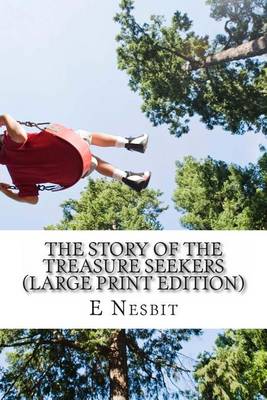
Metaphorosis Reviews
Written on Sep 4, 2023
Summary
After their mother dies and their father has a business setback, the six children of the family look for ways to 'restore the fallen fortunes of House Bastable'.
Review
I’ve always confused...Read more
4 stars, Metaphorosis reviews
Summary
After their mother dies and their father has a business setback, the six children of the family look for ways to 'restore the fallen fortunes of House Bastable'.
Review
I’ve always confused Edith Nesbit and Enid Blyton. In fact, though, I think I read a good deal more Blyton growing up, so Nesbit is relatively new to me, and I’ve been catching up now, in my old age. Something that surprised me in this book is just how funny she is – I kept laughing out loud and insisting on reading bits of this book to my rather startled spouse.
Some parts are clumsier than others (e.g., the narrator’s attempt to keep their identity secret), but effective for their intended audience of children. On the other hand, I appreciated that Nesbit doesn’t talk down to her audience much – the children of the story are driven in part by their family’s new poverty (relatively speaking), and that’s not hidden; they know what’s happening. The book, perhaps not surprising for its time, is an odd mix of attitudes. On one hand, there’s some ethnic stereotyping. On the other hand, an Indian is the wealthy benefactor and – aside from some false assumptions – this is presented as a simple matter of fact.
Overall, I enjoyed the book, and thought the beginning, with all its humor, excellent. I read it at the same time as a Dickens novel, so this book’s comments about Dickens’ stories were an interesting bonus. I’ve started the sequel, The Wouldbegoods, and I’m not so confident that the story needed continuation, but we’ll see.
Summary
After their mother dies and their father has a business setback, the six children of the family look for ways to 'restore the fallen fortunes of House Bastable'.
Review
I’ve always confused Edith Nesbit and Enid Blyton. In fact, though, I think I read a good deal more Blyton growing up, so Nesbit is relatively new to me, and I’ve been catching up now, in my old age. Something that surprised me in this book is just how funny she is – I kept laughing out loud and insisting on reading bits of this book to my rather startled spouse.
Some parts are clumsier than others (e.g., the narrator’s attempt to keep their identity secret), but effective for their intended audience of children. On the other hand, I appreciated that Nesbit doesn’t talk down to her audience much – the children of the story are driven in part by their family’s new poverty (relatively speaking), and that’s not hidden; they know what’s happening. The book, perhaps not surprising for its time, is an odd mix of attitudes. On one hand, there’s some ethnic stereotyping. On the other hand, an Indian is the wealthy benefactor and – aside from some false assumptions – this is presented as a simple matter of fact.
Overall, I enjoyed the book, and thought the beginning, with all its humor, excellent. I read it at the same time as a Dickens novel, so this book’s comments about Dickens’ stories were an interesting bonus. I’ve started the sequel, The Wouldbegoods, and I’m not so confident that the story needed continuation, but we’ll see.
